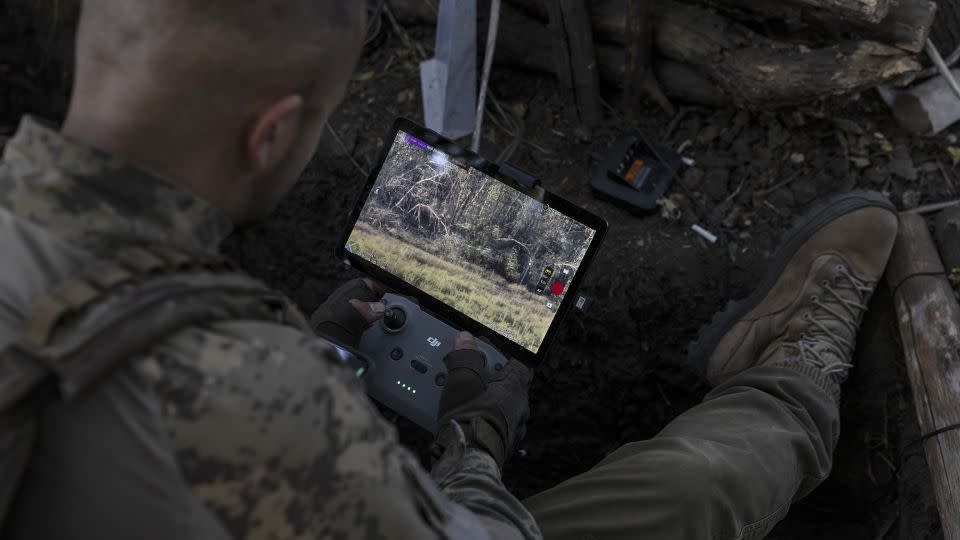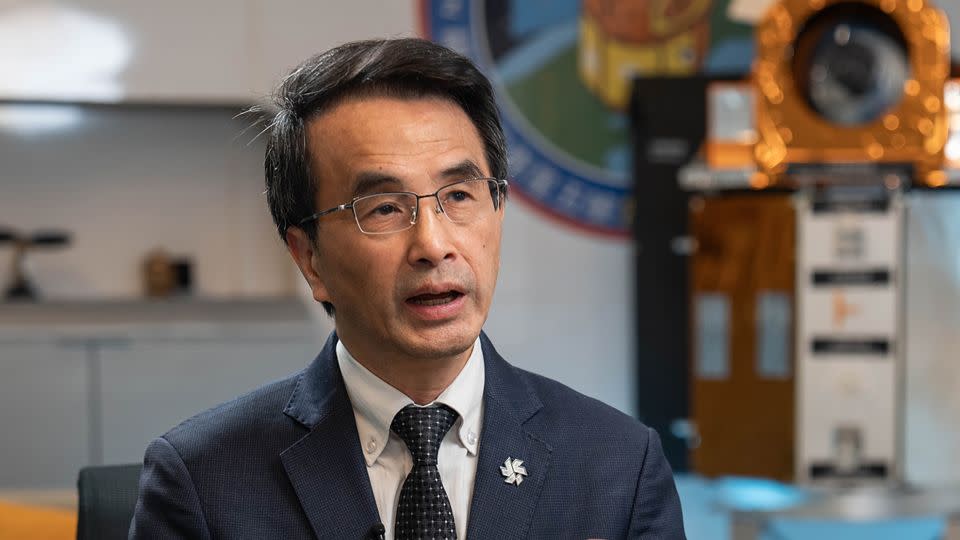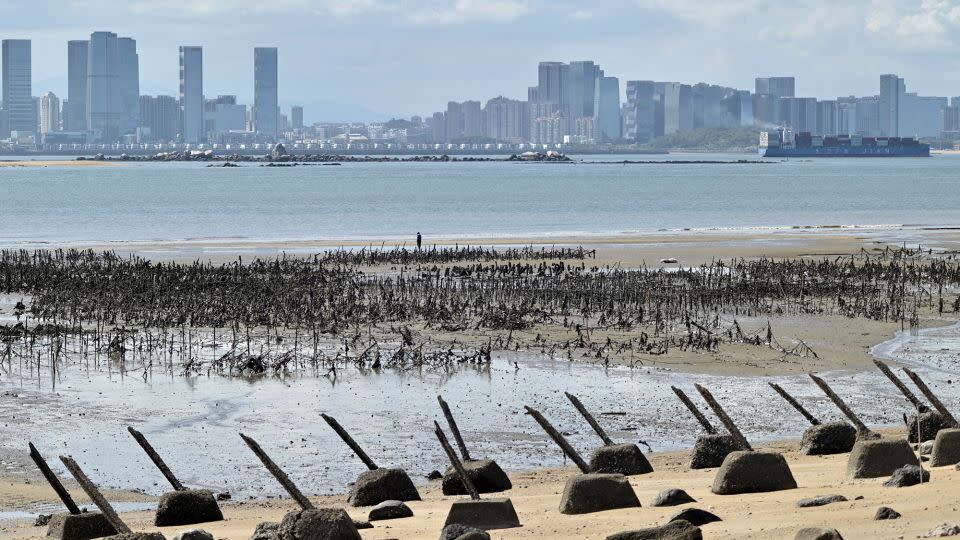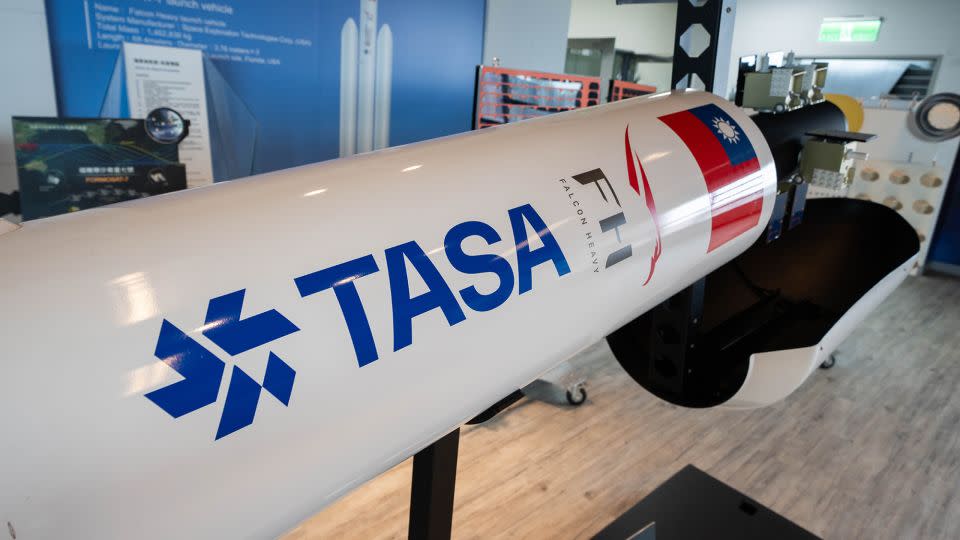Taiwan’s leaders are working on an ambitious new satellite system to keep the island online in the event of a disaster as it faces the ongoing threat of hostilities with China.
Wu Jong-shinn, director general of the Taiwan Space Agency (TASA), told CNN in an exclusive interview that Taiwan is in an “experimental development phase” in efforts to build new indigenous communications satellites.
Once operational, the system could work in a similar way to Elon Musk’s Starlink satellite system in providing internet access — albeit on a much smaller scale, said Wu, who has led Taiwan’s space programs since 2021.
Starlink, operated by Musk’s SpaceX, uses a network of thousands of satellites to deliver internet to users around the world, including areas where conventional connections are unavailable.
It has been used by the Ukrainian army on fronts to defend against the Russian invasion. In Gaza, devastated by Israel’s war against Hamas, staff at a field hospital have been allowed to conduct real-time medical video consultations.
But Taiwan does not have access to Starlink because SpaceX insisted on having a majority stake in a proposed joint venture, a requirement that is incompatible with local Taiwanese laws. This was one of the reasons Taiwan developed its own technology.
“The communications satellite is very important for our communications resilience during urgent periods,” Wu said, calling it his agency’s most sensitive project. “That’s very important to us, so we take it very, very seriously.”

A vulnerable network
Taiwan’s unique geopolitical landscape and location, approximately 100 miles off the coast of China, adds urgency to an ambitious project. China’s ruling Communist Party claims the island as part of its territory and has repeatedly vowed to take it by force if necessary.
Currently, Taiwan’s connectivity is provided by 15 submarine internet cables that connect the country to the rest of the world. But these cables are susceptible to damage. Last year, a group of remote Taiwanese islands were cut off from the internet for weeks after two undersea cables connecting them to Taiwan’s main island were damaged by passing ships.
High-speed internet is critical to the normal functioning of any society, but in the case of Taiwan, a deliberate attempt to sabotage the system could have other consequences. In a report published by the Institute for National Defense and Security Research, a research organization affiliated with the Taiwanese government, experts warned that if Beijing were to cut internet cables around Taiwan, it could disrupt regular communications and cause widespread panic.
Taiwanese authorities previously announced that the space agency would develop two communications satellites, the first of which could be launched in 2026. It would then also help private companies launch four additional satellites to help them navigate the industry. However, Taiwan would have to send hundreds of satellites if it were to create a system that provides uninterrupted backup Internet access, experts told CNN.


Brad Tucker, an astrophysicist at Australian National University, estimated that Taiwan would need at least 50 satellites to provide “reasonably decent” emergency coverage with its own satellite constellation – and the more the better.
“To really have the reliable bandwidth so that everyone can operate it, you need a lot more [satellites]you’re probably talking hundreds,” he said.
“If a country devotes itself to this, it can certainly complete it,” he added. “Because the hardest part is really just getting the financing to launch them all.”
Su Tzu-yun, director of Taiwan’s Institute for National Defense and Security Research, said it would be “unrealistic” to think that Taiwan would be able to provide full internet coverage with just a few indigenous satellites, but that the space project is valuable. long-term.
“Taiwan’s development in this area is very meaningful as it allows us to enter the space industry and provides our military with greater flexibility to access communications systems for our weapons development in the future,” he said.
And before Taiwan reaches that capability, the island can still provide backup connectivity in the near future by partnering with OneWeb, a satellite communications system headquartered in London, and other maritime satellite systems, he added.


Strengthening resilience
Ensuring that Taiwan’s communications systems remain functional during extraordinary times has become an increasing priority for the island’s top leaders in recent years. In addition to dedicating the satellite project to the space agency, the Taiwanese government established a digital affairs ministry in 2022 to enhance communications resilience. That ministry is working with overseas satellite service providers and installing new terminal equipment in remote locations in Taiwan to provide connectivity.
By the end of 2024, 700 hotspots will be set up across the island to enable satellite communications during emergencies, authorities announced in March. The initiative proved useful during a magnitude 7.4 earthquake that struck eastern Taiwan in early April.
While traditional communications systems near the epicenter were disrupted, authorities successfully used OneWeb to provide emergency internet access to rescuers and stranded personnel.
In the future, Taiwan’s satellite system could replace third-party deals, but Wu, the space agency’s director, declined to provide more specific details about the project’s timeline. The new government will release an updated blueprint and timeline of its space programs, including its communications satellite project, after Taiwan’s newly elected President Lai Ching-te takes office on May 20, according to people familiar with the matter.


Great ambitions in space
Taiwan’s space ambitions extend beyond the development of indigenous communications satellites.
Wu said a major goal is to create a new industry in Taiwan that can leverage the growing opportunities in international space projects. Last year, President Tsai Ing-wen announced an investment of NT$25.1 billion ($790 million) in the island’s space programs over the next decade, aiming to help companies in various industries – including chip design and precision machinery – enter the space industry enter. .
Despite its relatively small size, Wu says Taiwan is a desirable location to develop space projects because of its undisputed role as a leader in advanced semiconductor chips – which are needed to power everything from computers to artificial intelligence.
One Taiwanese company in particular, Taiwan Semiconductor Manufacturing Company (TSMC), produces an estimated 90% of the world’s super-advanced semiconductors and supplies global technology giants such as Apple and Nvidia.
In addition to semiconductors, Wu believes that Taiwan’s progress in information technology and precision machinery also brings benefits to the development of the space industry.
“Satellites are very complicated systems,” he said. “In a satellite you have 20,000 to 30,000 components. Once you send it into space, there’s no way to get it back and repair it, so it’s very heavy and very expensive.”
To accelerate its development, Taiwan’s space agency has also been working on developing a rocket system that can launch satellites into space. Taiwan has relied on foreign providers to send its satellites into space, such as Triton, an indigenous weather satellite launched last year from French Guiana in South America.
“We are working on a launch vehicle and we plan to launch rockets into our low Earth orbit starting in 2030,” Wu said, referring to satellite orbits with an altitude lower than 1,000 km above Earth. Once Taiwan has that technology, it can conduct test flights more often.
“We have a solid foundation and at this point I think we are ready to embark on the adventure more aggressively,” he added.
CNN’s Will Ripley and John Mees contributed to this report.
For more CNN news and newsletters, create an account at CNN.com